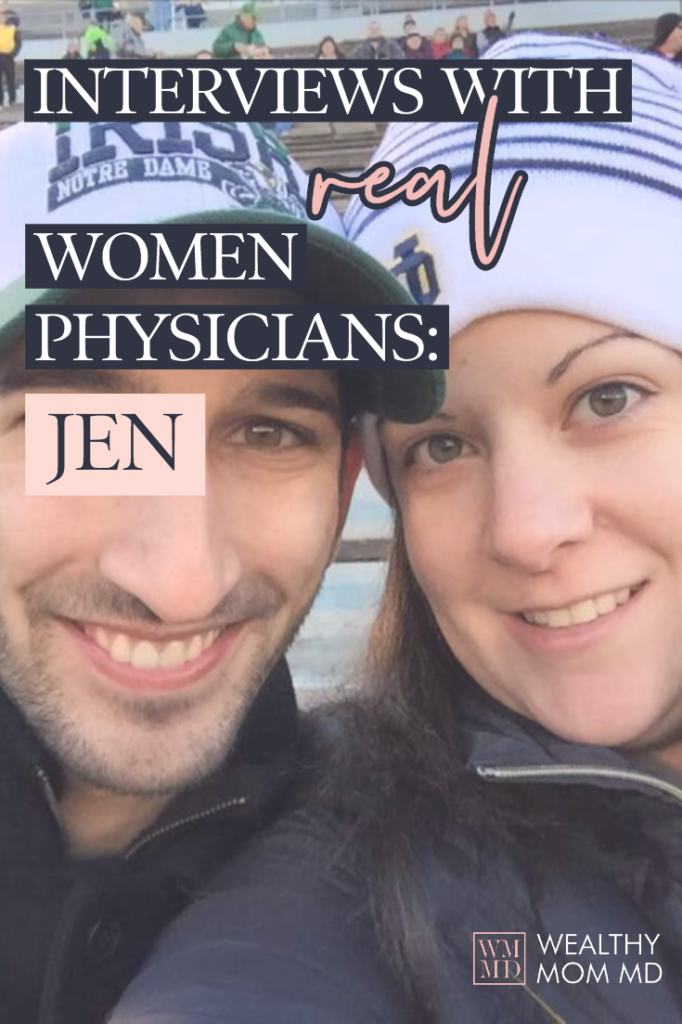Welcome to another installment of Interviews with Real Female Physicians. The goal of this series is to share their story so that you, the reader, may learn and be inspired from their experiences – good and bad. We all come from different backgrounds and have different situations. Some of you are married, some are not, some with kids, some with blended families. Let’s show other women that any of these can work financially!
So let's introduce our next woman physician rockstar – Jen!!
Tell us about yourself:
I’m Jen, a 31-year-old hospitalist in Tampa, FL. I’m married without kids. I have 2 corgis. I’m an avid reader and baker and a wannabe plant lady. I love internal medicine, it was definitely the right choice for me. When going through my third-year clinical rotations I started with internal medicine and loved it. After that, no other rotation compared so choosing a specialty was easy for me. For current medical students, my advice would be to listen to your gut and try to be aware of how you feel as you are rotating through the different specialties. Are you excited to go into work or are you counting the days until the rotation is over?
Are you a resident or attending?
I am an attending in my fourth year out of residency.
Did you graduate with student loans? How much & what are the interest rates?
Like many of us I paid very little attention to my student loans at the time I was taking them out. So, I actually don’t know the initial amount I borrowed. When I graduated residency the balance was at $180,000. I went to state schools for both undergrad and medical school. I had a full-tuition scholarship for undergrad plus some need-based grants. I had $5,800 in loans when I graduated from room and board costs. In medical school, I received some scholarship money (totaling about 30K) and the rest I paid for with loans. My interest rates ranged from 6-8.5%.
How fast (or not) are you paying them off?
When I graduated from medical school, I still didn’t pay much attention to my loans. Throughout my 3 year residency, I made the minimum income-based monthly payments (~$550/month) which didn’t even cover the interest that was accruing. During my first year as an attending, I continued to make minimum monthly payments and used my new salary to take a vacation every month for that first year.
During my second year as an attending is when I started to become more financially aware, mainly through blogs like this one, and realized I needed to get serious about paying off this debt. I started to make payments of $3,000 per month while I was figuring out my overall financial plan. In January 2018, I refinanced with SoFi. I had $119,000 left to pay off when I refinanced. This year I’ve averaged $8,000 per month in student loan payments and I currently have $49,000 left to pay off.
Looking for advice on what to do with your student loans? Talk to Travis Hornsby @ Student Loan Planner. 
Financial aspects of marriage
Are you married?
I am married. My husband works in higher education as an associate director of student advising at a local university.
Did you get a pre-nuptial or post-nuptial agreement?
We did not have a pre-nuptial or post-nuptial. We got married during medical school so neither of us had any assets to be concerned about at the time we were married.
Do you and your husband agree on finances?
We differ somewhat in our approach to finances. My husband is much more conservative and likes to plan for worst-case scenario, such as keeping a larger amount of cash savings as an emergency fund. I prefer to have a 3-month emergency fund, he prefers to have closer to 6 months. I am also more of a spender. What has worked for us is keeping our finances and accounts separate. We began doing this when we lived together before getting married. We divide the joint household expenses and each pay for our assigned expenses from our individual bank accounts. I pay the rent and utilities, he pays the cars and insurance. We each pay our own student loans. Whatever is left over after the necessary expenses are paid we are free to spend however we want.
Are you the breadwinner?
I am the breadwinner. My salary is about four times what my husband makes. I have not found that it affects our relationship. I think having separate finances and a system for each contributing to the joint expenses has mitigated any negative effects.
Have you experienced a financial catastrophe?
No, thankfully.
General Finances
What’s your FI (financial independence) number?
Our number is 3 million. We used 25x annual expenses plus some additional to account for increased health care costs and assisting our parents as they age.
Who handles the finances in your relationship? Are you DIY or do you have a financial advisor?
I handle the majority of the finances. I use a financial advisor only for my retirement accounts. She is affiliated with our university. Our pay structure and retirement options are complicated so it helps to have an advisor who knows the nuances of our system.
How are you saving for FI/retirement?
I have a 403b and 457b through my university which I am currently contributing minimally to, just $100 to each biweekly while I pay off my student loans. I also have a State University System of Florida ORP to which I contribute a mandatory 3% and my employer contributes 5%. I also have a 403b pension plan which my employer contributes 7.42% to. There is no option for employee contribution. This year I also started using the Roth IRA and put in the full $5,500.
Biggest budget failure/regret:
Not understanding my student loans sooner. I wish I had paid more during residency and had refinanced sooner.
Do you have insurance?
I have a small life insurance policy of $550,000 that my university covers the premiums for. My husband and I do not plan to have kids and we both work so I do not plan to get a larger policy. I also have disability insurance through my university which would pay 80% of my salary if I became disabled. I have an umbrella policy as well.
Do you give to charity? If so, where and why?
I give to Planned Parenthood $25 per month plus an additional $1,000-2,000 per year for special events or campaigns. I give $25 per month to JDRF, Humane Society of Tampa Bay, and Emily’s List as well. I give to various other causes throughout the year as well, whether for the university–a student-run free clinic or for disaster relief after last year’s hurricanes.
Tell readers a fun/random fact about you:
I refuse to eat anything pumpkin flavored because in kindergarten we made pumpkin bread and I ate the whole thing and threw up on the bus ride home. I was scarred for life.
Where can people connect with you?
I’m on Twitter and Instagram @jennifermcaputo or email jennifermcaputo at gmail.
And … that's a wrap! If you're interested in doing an interview, I'd love to hear from you!
I loved reading Jen's story and her no-nonsense approach to finances. I hope you did too!

Get the bestselling book - Defining Wealth for Women.





